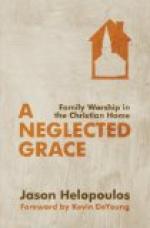The necessity of family religion is seen in the value of the soul. The soul is the dearest treasure and the most responsible trust of home. What shall it profit the family if its members gain the whole world and lose their own souls? What would Christian parents give in exchange for the souls of their little ones? Is it not more important that they teach them to pray than to dance, to “seek the kingdom of heaven” than the enjoyment of “the pleasures of sin for a season?” Oh, what is home without a title to, and personal meetness for, that kingdom? It is a moral waste; its members move in the putrid atmosphere of vitiated feeling and misdirected power. Brutal passions become dominant; we hear the stern voice of parental despotism; we behold a scene of filial strife and insubordination; there is throughout a heart-blank. Domestic life becomes clouded by a thousand crosses and disappointments; the solemn realities of the eternal world are cast into the shade; the home-conscience and feeling become stultified; the sense of moral duty distorted, and all the true interests of home appear in a haze. Natural affection is debased, and love is prostituted to the base designs of self, and the entire family, with all its tender cords, ardent hopes, and promised interests, becomes engulfed in the vortex of criminal worldliness!
But reverse the picture! See what home becomes with religion as its life and rule. Human nature is there checked and moulded by the amiable spirit and lovely character of Jesus. The mind is expanded, the heart softened, sentiments refined, passions subdued, hopes elevated, pursuits ennobled, the world cast into the shade, and heaven realized as the first prize. The great want of our intellectual and moral nature is here met, and home education becomes impregnated with the spirit and elements of our preparation for eternity.
The relations of home demand family religion. These are relations of mutual dependence, involving such close affinity that the good or evil which befalls one member must in some degree extend to all the other members. They involve “helps.” Each member becomes an instrument in the salvation or damnation of the others. “For what knowest, O wife, whether thou shalt save thy husband? or how knowest thou, O man, whether thou shalt save thy wife?”—1 Cor. vii., 16. “If one member Suffer, all the members suffer with it.” They stimulate each other either to salvation or to ruin; and hence those children that go to ruin in consequence of parental unfaithfulness, will “curse the father that begat them, the womb that bare them,” and the day they entered their home.
Many parents seek to excuse themselves from the practice of family religion, upon the ground that they have not the capacity nor the time. If so, you should not have married. But if you are Christians, you have the capacity, and you will take the time.
But some are ashamed to begin family religion. Ashamed of what? of your piety? of your children? of the true glory and greatness of your home? Then you are ashamed of Jesus! You should rather blush that you have not begun this good work.




